The Economist Intelligence Unit (EIU) has published the results of a Microsoft-sponsored study entitled, “Intelligent Economies: AI’s Transformation of Industries and Society.” The study draws on a survey of more than 400 senior executives working in various industries, including financial services, healthcare and life sciences, manufacturing, retail and the public sector. The survey was conducted in eight markets: France, Germany, Mexico, Poland, South Africa, Thailand, the UK and the US. Essentially, the study explores the transformative potential of artificial intelligence (AI) on markets and societies across the developed and developing worlds.
As AI becomes increasingly embedded in the society, it will not only change the businesses that adopt it but will also have significant economic, social and civic effects on citizens and consumers. National and regional economies will become more effective in the way they produce and distribute goods and services. But such transformations will also introduce new challenges such as ethical or security concerns as well as cost and execution risk. This study is aimed at helping senior business and public-sector leaders understand the significant social potential of AI across industries and countries, with special attention devoted to the differences between advanced and emerging markets. In particular, Intelligent economies explores to what extent corporate and government decision-makers believe AI will help meet their toughest challenges, including growth, productivity, innovation and job creation.
Overall, AI is on course to transform the global economy—and organizations around the world have high hopes for its potential. As per the report, in 2017 the global economy recorded its best performance in six years and looks set for sustained growth in 2018. The Economist Intelligence Unit expects global growth of 3.8%, surpassing 2017’s growth rate of 3.7% and well above 2016’s 3.2%.
Key findings of the study include-
- Businesses expect AI to have a positive impact on growth (90%), productivity (86%), innovation (84%) and job creation (69%) in their country and industry
- Nine out of ten executives from around the world (94%) describe AI as important to solving their organizations’ strategic challenges
- More than one in four (27%) say their organizations have already incorporated AI into key processes and services, while another 46% have one or more AI pilot projects under way
- Despite often-expressed concerns about job displacement, respondents were broadly optimistic that AI will create new roles. Overall, nearly six out of ten (59%) believe that AI will increase wages and 56% actually see a boost to the employment rate in their country or industry
- Surprisingly, developing economies are significantly more bullish about the positive effects of AI, with 83% of them expecting an increase, compared with just six out of ten respondents in advanced economies
- Financial services respondents report particularly high levels of virtual assistant adoption (48%), but they’re also using predictive analytics (38%) and machine learning (36%). The public sector, meanwhile, has particularly high levels of machine learning adoption (34%)



